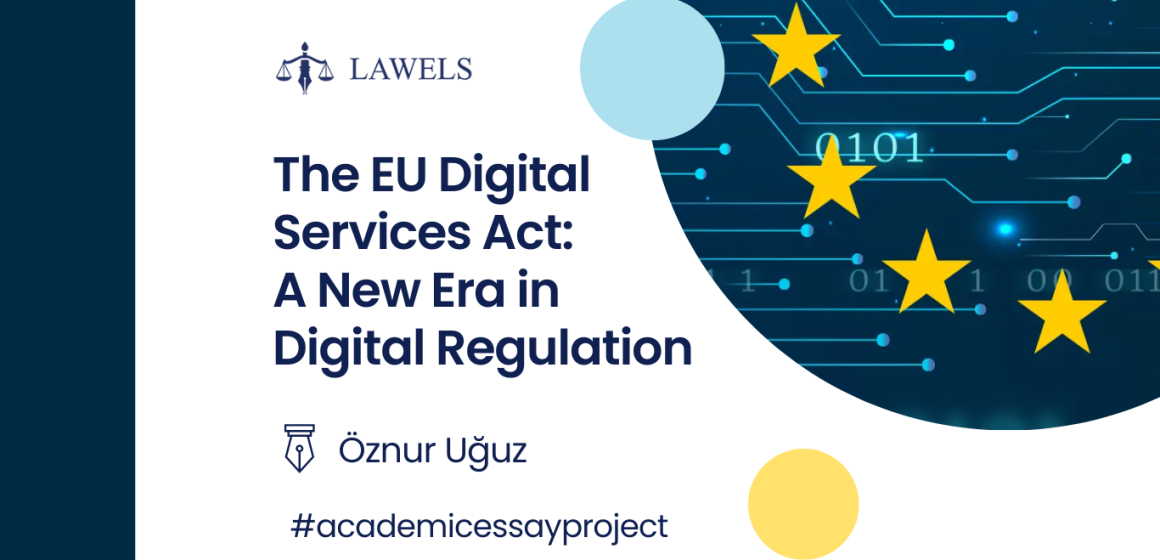Author: Öznur Uğuz, MSc in European Economy and Business Law at Tor Vergata University of Rome, 2021-2023
Legal Editor: Bader Kabbani, LLM International Commercial and Economic Law, SOAS, University of London, 2020-2021
Abstract
The Digital Services Act (DSA) is the new digital services regulation of the European Union (EU), which sets a high new standard for online platforms regarding content moderation and transparency. The DSA was proposed by the European Commission in December 2020. The proposal was followed by years of negotiations, which were concluded by the final agreement of the EU institutions in April 2022. The Act finally entered into force on 16 November 2022 and will apply across the EU from 17 February 2024. This article gives a brief overview of the DSA and highlights possible issues that might arise under the Act.
Introduction
The DSA aims to create a safer and more open digital space for both users and businesses by setting a uniform transparency and accountability framework across the EU. It regulates the provision of digital services in a single market and imposes a new set of obligations on intermediary service providers. The new obligations will guide companies on how to tackle illegal content, goods and services on their platforms while also protecting users’ fundamental rights. The DSA builds on the e-Commerce Directive (Directive 2000/31/EC), which has been the main legal framework for digital services in the European single market since 2000. The act replaces the e-Commerce Directive’s provisions on the liability of online intermediaries. The rest of the e-Commerce Directive and the other EU laws governing the digital sphere, including data protection and copyright laws, will continue to remain in force.
While the DSA will become applicable for all regulated platforms on 17 February 2024, for very large online platforms (VLOPs) and very large online search engines (VLOSEs), it will start to apply from an earlier date, which is four months after their designation. The rules will be applicable to all those who provide digital services in the single market, regardless of whether they are established in the EU or not. The obligations of service providers under the act will be proportionate to their nature, size, and impact on the digital ecosystem. VLOPs and VLOSEs with 45 million users in the EU will be subject to a stricter regulatory regime due to their crucial role in the facilitation of public debate, financial transactions, and dissemination of information. On the other hand, small and micro enterprises will be exempt from many costly obligations in hopes of promoting the development of start-ups and smaller businesses in the single market.
An Overview of the Digital Services Act
The DSA lays down a number of measures to counter illegal content, goods and services online. Article 16 of the Act requires hosting service providers to establish certain mechanisms that allow individuals or entities to notify them about the presence of illegal content on their platforms, against which the providers will have to take quick action. Moreover, Article 22 introduces a new system of trusted flaggers, under which independent individuals or entities with certain expertise, such as law enforcement agencies or profit-seeking industry organizations, can easily “flag” illegal content or goods for removal. Users whose content is removed by online platforms, on the other hand, will be able to challenge such decisions by either making a direct complaint to the platform or seeking redress before courts or through an out-of-court dispute settlement body. In terms of liability for illegal content, intermediary service providers will not be liable for the unlawful activities of their users unless they have actual knowledge of the matter. Yet, once such content becomes known to a service provider, the provider is required to take diligent action to remove the content in order to remain exempt from liability.
VLOPs and VLOSEs will have additional duties to perform in order to prevent the misuse of their services, including carrying out risk assessments at least annually (Article 34) and taking mitigating measures accordingly (Article 35). Under Article 37, they will need to undergo independent audits to verify their compliance with the Act’s due diligence obligations and their capability of dealing with potential risks. In times of crises, such as situations that constitute a serious threat to public security or public health, VLOPs and VLOSEs may be required to take extra measures as laid out in Article 36. These measures include assessing whether the functioning of a platform’s services contributes to the threat to the public and if so eliminating any such contribution by taking mitigating actions such as those provided for in Article 35.
In addition to the regulations on illegal content, goods and services, the legislation introduces new transparency measures for online platforms on a variety of issues, including company terms and conditions, and content and product recommendation algorithms. Online platforms will no more be allowed to design their interfaces in a way that impairs the ability of users to make informed decisions of their own will. Furthermore, under Article 40, vetted researchers who meet certain requirements will be able to access key data of the largest platforms so as to provide more insight into the operation of platforms and the online risks involved. The new transparency measures also cover online advertising. Under Article 26, recipients of advertisement services will be able to access more information about advertisements they see on online platforms. Targeted advertising based on the use of special categories of personal data, such as sexual orientation, ethnicity or political views, is also banned under Article 26. Moreover, Article 28 provides new safeguards for the protection of minors and forbids platforms from using minors’ personal data for targeted advertising.
The responsibility for the enforcement and supervision of compliance with the DSA will be shared between the European Commission and the EU Member States. The Commission will be the primary regulator for VLOPs and VLOSEs and will have investigatory powers as well as the ability to impose fines of up to 6% of platforms’ global turnover. Member States, on the other hand, will be responsible for supervising intermediary service providers whose main establishments are located in their territory. Each Member State will assign an independent competent authority as the Digital Services Coordinator, which will be endowed with the investigation and enforcement powers, including carrying out inspections on premises and imposing fines. The European Board for Digital Services (the ‘Board’) is also a part of the enforcement framework. The Board is an independent advisory group of Digital Services Coordinators and will advise the Digital Services Coordinators and the Commission on the supervision of intermediary platforms in accordance with the provisions of the Act.
Areas of Concern
While the DSA is considered by many as a significant step forward in the regulation of digital services, it is not entirely free of criticism. According to some researchers and advocacy groups, the DSA’s negligence-based liability regime might be a cause of concern from two different perspectives. On one hand, the liability model might result in disproportionate restrictions on users’ freedom of expression by encouraging platforms to act too cautiously and take action even against legitimate content so as to avoid any liability. On the other hand, it might also become a reason for platforms to not monitor their online content except when it is dictated by law, given that they will have no liability for illegal content of which they are not aware.
Another concern relates to the terminology used in the legislation. The DSA defines illegal content as any information which is not compliant with Union law or the law of any Member State that is in compliance with Union law. According to some, this vague definition may result in different applications of the rules in different territories as some content or activity might be illegal in some member states while not in others. New transparency regulations that require online service providers to disclose information regarding the procedures, measures and tools used for content moderation have also become a matter of criticism. It is argued that giving access to such confidential data may put platforms in a vulnerable position, risking their competitive advantage in the market. Lastly, the multi-agent supervision model adopted by the DSA poses concerns regarding enforcement. Under the Act, the competence areas of the European Commission, the DSCs and the Board are not strictly separated. What is more, the procedures to follow in the event of a dispute between a DSC and the Commission, or between different DSCs are unclear from the provisions.
Conclusion
Despite certain drawbacks, the DSA is a milestone legislation in the regulation of digital services, which could set a precedent for the rest of the world. However, the extent of its impact will depend on its effective implementation as with all legislative frameworks. If implemented correctly, the DSA could overhaul the problems that arise in the rapidly developed digital ecosystem, which existing laws are not able to address accurately.
References
Regulation (EU) 2022/2065 of the European Parliament and of the Council of 19 October 2022 on a Single Market For Digital Services and amending Directive 2000/31/EC (Digital Services Act)
Allen A, Stockhem O, ‘A Series on the EU Digital Services Act: Tackling Illegal Content Online’ (2 August 2022) <https://cdt.org/insights/a-series-on-the-eu-digital-services-act-tackling-illegal-content-online/> date accessed 25 December 2022
Allen A, Stockhem O, ‘A Series on the EU Digital Services Act: Due Diligence in Content Moderation’ (10 August 2022) <https://cdt.org/insights/a-series-on-the-eu-digital-services-act-due-diligence-in-content-moderation/> date accessed 25 December 2022
Allen A, Stockhem O, ‘A Series on the EU Digital Services Act: Ensuring Effective Enforcement’ (18 August 2022) <https://cdt.org/insights/a-series-on-the-eu-digital-services-act-ensuring-effective-enforcement/> date accessed 25 December 2022
Armingaud C, Elteste U, Scarparo C, Nietsch T, Müller A, ‘EU Digital Services Act: Fundamental Changes For Online Intermediaries?’ (4 November 2022) < https://www.klgates.com/EU-Digital-Services-Act-Fundamental-Changes-for-Online-Intermediaries-11-4-2022> date accessed 25 December 2022
Bertuzzi L, ‘A sneak peek at the Commission’s preparation for the Digital Services Act’ (27 October 2022) <https://www.euractiv.com/section/digital/news/a-sneak-peek-at-the-commissions-preparation-for-the-digital-services-act/> date accessed 25 December 2022
DIGITALEUROPE, ‘Digital Services Act Position Paper’ (31 March 2021) < https://www.digitaleurope.org/resources/digital-services-act-position-paper/> date accessed 25 December 2022
Geese A, ‘The Digital Services Act is Coming. What Will It Mean For You?’ (20 January 2022) <https://www.greens-efa.eu/opinions/the-digital-services-act-is-coming-what-will-it-mean-for-you/> date accessed 25 December 2022
Loyens & Loyeff, ‘EU Council Adopts Digital Services Act’ (6 October 2022) <https://www.loyensloeff.com/insights/news–events/news/eu-council-adopts-digital-services-act/> date accessed 25 December 2022
‘The Digital Services Act: ensuring a safe and accountable online environment’ <https://commission.europa.eu/strategy-and-policy/priorities-2019-2024/europe-fit-digital-age/digital-services-act-ensuring-safe-and-accountable-online-environment_en> date accessed 25 December 2022
‘The Digital Services Act package’ <https://digital-strategy.ec.europa.eu/en/policies/digital-services-act-package> date accessed 25 December 2022.
This article is written within the Academic Essay Project (AEP) organised by LAWELS. AEP aims to increase the number of quality academic writings on legal topics, encourage young lawyers to participate in academic writing, and lay the foundation of an online database on legal science. The team of legal editors and legal writers share their knowledge through high-end essays that we are publishing on our website and social media accounts for the world to read and learn from.
The articles on the LAWELS platform are not, nor are they intended to be, legal advice. You should consult a lawyer for individual advice or assessment regarding your own situation. The article only reflects the views of the author.


